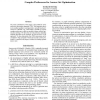Free Online Productivity Tools
i2Speak
i2Symbol
i2OCR
iTex2Img
iWeb2Print
iWeb2Shot
i2Type
iPdf2Split
iPdf2Merge
i2Bopomofo
i2Arabic
i2Style
i2Image
i2PDF
iLatex2Rtf
Sci2ools
107
click to vote
KR
2004
Springer
2004
Springer
Complex Preferences for Answer Set Optimization
The main contribution of this paper is the definition of the preference description language ¡¢ . This language allows us to combine qualitative and quantitative, penalty based preferences in a flexible way. This makes it possible to express complex preferences which are needed in many realistic optimization settings. We show that several preference handling methods described in the literature are special cases of our approach. We also demonstrate that ¡¢ expressions can be compiled to logic programs which can be used as tester programs in a generate-and-improve method for finding optimal answer sets.
Artificial Intelligence | KR 2004 | Penalty Based Preferences | Preference Description Language | Preference Handling Methods |
Related Content
| Added | 02 Jul 2010 |
| Updated | 02 Jul 2010 |
| Type | Conference |
| Year | 2004 |
| Where | KR |
| Authors | Gerhard Brewka |
Comments (0)

